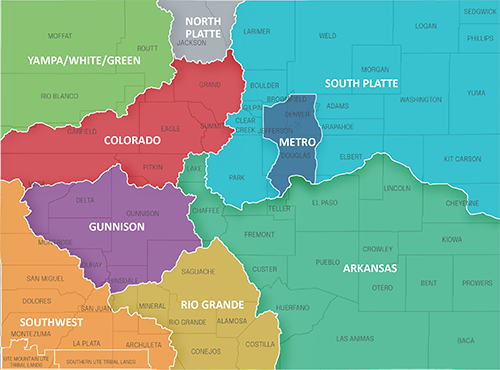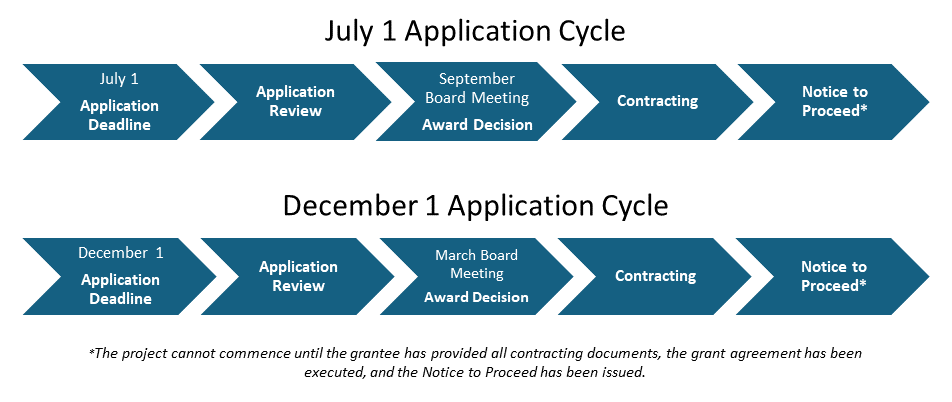Colorado Water Plan Grants
General Information
The Colorado Water Plan Grant Program supports implementation of the Colorado Water Plan. The Partner Actions within the plan offer examples of the types of project level work that CWCB can help support through this grant program. All grant applications will be assessed based on funds available for a particular Water Plan category.
Whether or not you've applied before, read the Water Plan Grant Guidelines for:
- Information on applicant eligibility
- General program process
- Payment information
- Application process information
- Category specific requirements
All Water Plan Grants must be submitted via the CWCB Portal along with a Statement of Work (Word Doc) and a Budget and Timeline (Excel).
- Water Plan Grant Guidelines (Updated July 2025)
- CWCB Portal Registration
- Water Plan Grant Application (via Portal)
- Portal Application Questions (sample for internal applicant use only)
- Statement of Work
- Budget & Timeline
- Required and optional materials - See How Do I Apply - in the FAQ section below
Available Funding
The CWCB offers two grant cycles each year, with application deadlines on July 1 and December 1.
For the 2026 grant application cycles, the CWCB anticipates having approximately $37.7 million total available to award. The CWCB Board will set target allocations for the following grant categories at its May 2026 Board meeting:
- Agriculture
- Conservation and Land Use Planning
- Engagement and Innovation
- Storage and Supply
- Watershed Health and Recreation
This website will be updated once the target category allocations are finalized.
Important: Applicants are strongly encouraged to reach out to their Regional Grant Manager for questions and to schedule a pre-application meeting several months prior to submitting.
Please contact a CWCB staff member in advance of applying for a grant:
Regional Grant Manager | Region | Email/Phone |
|---|---|---|
Lauren Duncan | Arkansas Basin | 720-788-2178 |
Ashley Garrison | Colorado, Gunnison, and | 719-466-9626 |
Jackie Carano | Metro, South Platte, and North | 720-846-1571 |
Laura Spann | Rio Grande and Southwest | 720-916-7723 |
Colorado Water Plan Grant program funding categories include:
- Water Storage & Supply - includes development of additional storage, artificial recharge into aquifers, and dredging existing reservoirs to restore the reservoirs' full decreed storage capacity for multi-beneficial projects and projects identified in basin implementation plans to address the water supply and demand gap.
- Water Sharing Agreements - includes projects that meet defined water needs while mitigating impacts associated with traditional water transfers.
- Conservation & Land Use Planning - includes long-term strategies for conservation, land use, water efficiency, and drought planning.
- Engagement & Innovation - includes water education, outreach, and innovation efforts.
- Agricultural - includes technical assistance or project/program funding for agricultural projects.
- Watershed Health & Recreation - includes planning, design, and implementation of watershed health and recreation projects.
All application materials must be submitted through the CWCB Portal by the application deadline. Letters of support are not required but encouraged. All letters of support, including those from basin roundtables, must be submitted through the CWCB Portal by the application deadline. (see "How can I apply?" dropdown below). Please contact your regional Water Plan Grant manager with any questions and to review instructions for all required application materials.
Learn more about the Water Plan Grant Program in our Annual Reports:
Fiscal Year 2024-25 Annual Report
Annual | Submitted Applications | Board Approval |
|---|---|---|
| December 1 | January | March Board Meeting |
| July 1 | August | September Board Meeting |
Frequently Asked Questions
- Who can apply?
- Governmental entities – municipalities, districts, enterprises, counties, and State of Colorado agencies. Federal agencies are encouraged to work with local entities.
- Covered Entities as defined in Section 37-60-126, C.R.S., are eligible if the applicant has adopted an approved water conservation plan.
- Private entities - mutual ditch companies, non-profit corporations, and partnerships.
- How can the money be used?
Examples of eligible projects and activities:
- Technical assistance regarding permitting, feasibility studies, and environmental compliance.
- Studies or analysis of structural, programmatic, consumptive, and non-consumptive water projects or activities.
- Design of structural projects or activities.
- Activities that promote education, outreach, and innovation consistent with the mission and goals of the Water Plan Grant.
- How do I apply?
Application Materials
- CWCB Portal Registration (Start Here) Please note that confirmation of registration may take 1-2 days and you will receive an email once your registration is approved.
- All grant applications must be submitted via the CWCB Portal (opens in new window) along with the current "Statement of Work” and “Budget & Schedule."
- Applicant must upload both the Statement of work and budget to the portal in Word & Excel.
- All letters of support, including those from basin roundtables, must be submitted through the CWCB Portal by the application deadline.
- Water Sharing Agreements & Alternative Transfer Methods Supplemental Application - required only for Water Sharing Agreements grants
- Engagement & Innovation Supplemental Application - required only for Engagement & Innovation grants
Forgot your Portal password or the password reset isn't working? Contact Carolyn Kemp at carolyn.kemp@state.co.us. Please allow 1-2 business days for assistance.
- What happens if my grant is approved?
- CWCB board approval does not mean your grant agreement is executed.
- Reimbursement eligibility commences upon the grantee's receipt of a Notice to Proceed (NTP) and formal State Agreement.
- NTP will not be accepted as a start date. Project activities may commence as soon as the grantee enters into contract with the State and receives a formal signed State Agreement.
- Please review the CWCB's Grant Disbursement Policy. If you have any questions, please contact your CWCB grant manager.
Examples of approved projects:
- Agriculture
Colorado Master Irrigator:
Colorado Master Irrigator offers farmers and farm managers in the High Plains Aquifer region advanced training on conservation- and efficiency-oriented irrigation management practices and tools. Colorado Master Irrigator's interactive class format is designed to encourage peer-to-peer exchange among participants and instructors, helping forge useful contacts that graduates can reach out to after their participation in the program. Funding partners, in addition to CWCB, include Colorado State University, the United States Department of Agriculture, Rocky Mountain Farmers Union, Colorado Association of Conservation Districts, the Republican River Water Conservation District, and local businesses. Learn More
Food Asset Mapping & Water Conservation in the San Luis Valley:
Through this project, CWCB and Colorado State University, along with local partners, including the San Luis Valley Local Foods Coalition and the City and County of Denver are assessing the potential water conservation benefits and opportunities of linking urban food policies and programs with rural communities. The goal of the research initiative is to develop a better understanding of how coordinated market development in urban areas, and the availability of essential food infrastructure, may potentially assist with groundwater sustainability efforts in the San Luis Valley region. Learn More
Acequia Conservation Initiative:
The Acequia Conservation Initiative aims to strategically protect lands irrigated by acequias - shared irrigation canals and ditches - in the Culebra River watershed. CWCB, through a funding partnership with the United States Department of Agriculture, Sangre de Cristo Acequia Association, Colorado Open Lands, Great Outdoors Colorado, and local foundations, awarded financial support to provide cost-share to encourage water conservation, soil health, and wildlife habitat restoration. The initial phase of the initiative began in 2018 and is ongoing. Learn More- Conservation & Land Use
Colorado Growing Water Smart:
Colorado Growing Water Smart (CGWS) builds the capacity of local jurisdictions to plan and implement long-term strategies for the integration of land use and water planning. In partnership with CWCB, CO Department of Local Affairs, Northwest Colorado Council of Governments, Western Resource Advocates, and Keystone Policy Center, the Sonoran Institute and Lincoln Institute of Land Policy provide training, technical assistance, and other resources to communities that allow them to better understand current and future water supply and demand, the range of land use planning tools to align growth and development with forecasted water supplies, and engage and educate their community to build support for needed plans and policies. Learn MoreDenver One Water Plan:
Denver’s One Water Plan (OWP) is an integrated land use and water resources plan initiated by the City and County of Denver with support from a wide variety of stakeholders. The OWP will serve as a unique and innovative approach to establishing policies around how the City manages its watersheds in a holistic manner. Currently, the City is experiencing unprecedented growth but has limited land use policies to help guide water decisions as demands increase. The OWP will set out a framework for collaboration and implementation of critically needed water conservation and alternative water resource policies that are coordinated with newly developed land use plans. Learn MoreThe Sustainable Water Solution:
This proposed pilot will enable Denver Water to measure water savings in new construction homes built with the Greyter HOME Solution, Phyn Plus, and Uponor Logic plumbing over a 12 month period. The outcomes of the project will provide local and state officials with information regarding water conservation, innovation, and education. The data will not only validate the water conservation capability of these technologies, but will educate Coloradans about water savings capabilities of graywater use, leak detection, structured plumbing, and real-time data into conservation efforts.- Engagement & Innovation
Water Legacy: Documenting Knowledge for Future Generations:
The goal of the Water Legacy Project is to interview key Colorado water professionals (who have retired or are close to retirement) to learn about their lives and careers. This includes capturing stories, insights, and information that may not be recorded or documented anywhere else. Partners include PHA and the Colorado State University Water Resources Archive. View Video ArchivesSandhill Crane Water Education and Engagement Project:
Thousands of visitors come to the San Luis Valley to watch the Sandhill Cranes migrate each spring and fall generating a significant amount of money injected into the local economy. Grant funds are being used to create water-related programming for the Monte Vista Crane Festival to engage visitors in water issues locally and statewide. Watch Colorado Open Lands YouTube Video- Watershed Health & Recreation
Shady Island River Park Project:
The County plans to develop the Shady Island parcel to create riverside boat access, recreation amenities, improvements to riparian, wildlife and in-stream fish habitat. The goal of the proposed concept is to improve access to the Gunnison River for both boating and angling and restore riparian, stream and fisheries habitat. The Park also includes camping, picnic, play areas, and improved parking. Key areas along the shoreline shall be thinned of vegetation, allowing the bank to lay back, reducing the slope. Learn MoreFish Creek Watershed Wildfire Protection Plan:
The City of Steamboat Springs and Mount Werner Water & Sanitation District received a Colorado Water Plan grant to develop a Critical Community Watershed Wildfire Protection Plan (CWP2) for the Fish Creek Basin. This plan looks before, during and after a wildfire to protect the critical drinking water water supply and infrastructure as well as overall watershed health. Learn More- Water Storage & Supply
Collaborative Storage Study
The Conejos Cooperative Project will implement and expand upon the recommendations of the Trujillo Meadows (ATM) project and investigate and select opportunities for development of additional storage and coordinated water operations to provide multiple benefits. An enlargement of Trujillo Meadows Reservoir, and/or construction of new storage on the San Antonio upstream of Antonito or a gravity conveyance from the Conejos River to the San Antonio River, coupled with coordinated operations with Platoro Reservoir, can provide multiple benefits to agricultural water rights holders on the Rio de Los Pinos and San Antonio rivers. View Grant ApplicationLittle Thompson Farm ATM Grant Completion Report
Yampa Basin Alternative Agricultural Water Transfer Methods Study
Submitted Applications

